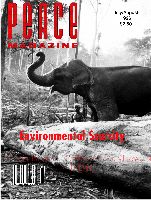
Peace Magazine Jul-Aug 1996, page 7. Some rights reserved.
Search for other articles by Ross Smyth here
Captain Erroll Boyd, a veteran of World War I, became in 1930, the first Canadian to fly the North Atlantic Ocean. Dubbed the "Lindbergh of Canada" in the U.S. press, he was a peace advocate in an era of war heroes.
While employed as aviation editor of the Toronto Star Weekly in 1938, Erroll Boyd formed the Aviation Scouts of Canada, a forerunner of the air cadet movement. Boyd promoted the development of an international peace air force for the League of Nations - a United Air Force for Peace and Defence. Every nation could subscribe to an international air pact and keep part of its air force ready for mobilization at short notice. These combined forces would be at the permanent disposition of the League of Nations, although each would be kept in its own country during times of peace. The force would be commanded by an Air Marshall and supported by major contributing countries. In the event of tension between two countries, it was to fly over the borders and cities, serving as a police force and showing the power at the disposal of the League. It might drop peace propaganda on the disputing territories or provide aid in natural disasters. If fighting began, it would assist the party that the League considered right. Boyd felt that such a force could have prevented the war between China and Japan and the civil war in Spain; and that its existence would be a logical follow-up to the Kellogg-Briand anti-war pact of 1928.
When World War I broke out, Boyd had gone to England as one of the first Canadians in the Royal Naval Air Service. After bombing a U-boat, he worried about the fate of its crew, but rationalized that they were sinking civilian ships. On a bombing raid over Belgium, he was hit by German fire and crash landed in neutral Holland. Later paroled to North America, he made friends in New York with the manager of Henry Ford's peace ship to Europe. The automobile pioneer had chartered an ocean liner in an effort to stop the war, but met with skepticism. Boyd once wrote:
There are two sides to war - yours and mine...A hostile aircraft flies over our city and drops bombs. Suppose these men who were hired to murder me and my family were invited to my apartment. We would discuss problems of life and death. Possibly we would agree on the futility of killing each other. But this would get us nowhere. We and they are not important enough to count. The fate of the world is not hanging upon our shoulders. We are merely patriotic killers.
On the other hand, supposing I invited into the same apartment a group of diplomats. We become very familiar. Yet I know and they would know that anything we said or did would be a lie. These men are trained in a profession to fabricate the truth in the same way and with the same precision that I am trained to kill in the air and on the ground...These gentlemen flatter me and remain my friends only so long as I execute their murderous demands. So long as the war lasts, either I continue to follow in accordance with their political plans, or else...
Why did these diplomats and patriotic murderers decide in 1914 that I should go out and kill, according to their dictates, any man, woman or child whose fate threw them in my way? Why should I hazard my life in effecting the schemes of these self-ordained gods of war? I did not ask these questions in 1915. I was young. I thought I was about to become a hero.
On his parole from internment, Boyd was indeed treated as a hero. Just before the Second World War broke out in 1939, he and his family moved to the U.S. where he recruited hundreds of ferry pilots for the anti-Hitler crusade before Pearl Harbor.
His ideas about war are consistent with the aims of the present peace movement. Is it not time to revive the idea of a Peace Air Force under command of the United Nations?
Ross Smyth is president of the World Government Organizations Coalition and a past president of the World Federalists of Canada. He was one of Boyd's aviation scouts in 1938. He is author of the forthcoming book,The Lindbergh of Canada.

Peace Magazine Jul-Aug 1996, page 7. Some rights reserved.
Search for other articles by Ross Smyth here